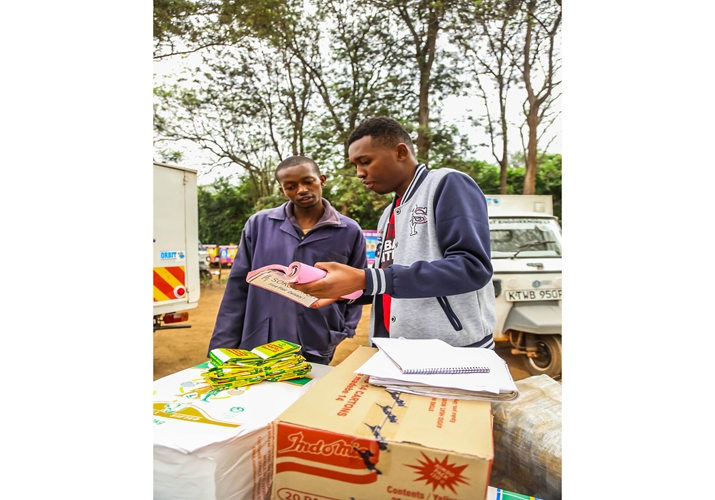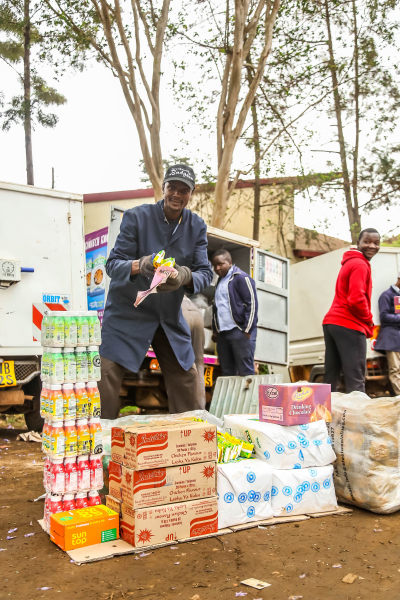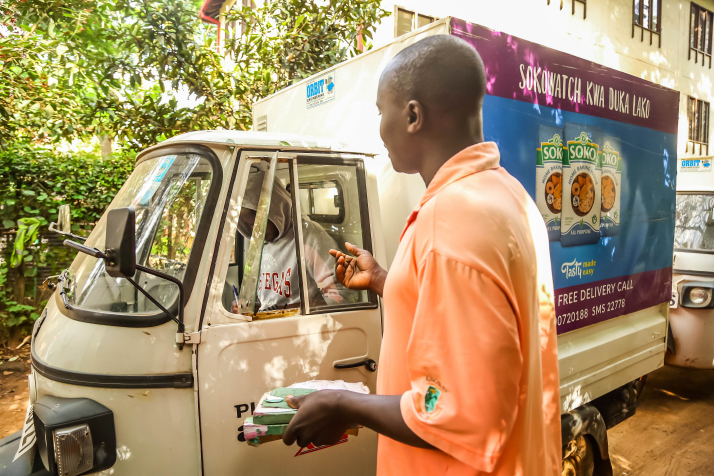|
||||||||||
| Home Nation World Business Opinion Lifestyle ChinAfrica Multimedia Columnists Documents Special Reports |
|
||||||||||
| Home Nation World Business Opinion Lifestyle ChinAfrica Multimedia Columnists Documents Special Reports |
| ChinAfrica |
| Innovative technology-based solutions keep food supply chains open during pandemic in East Africa |
| Whereas the COVID-19 pandemic has invariably upended people’s lives while adversely impacting their health to the point of death in some instances, certain innovations in Kenya are addressing this unprecedented challenge head on |
| By Geoffrey Kamadi VOL.12 September ·2020-09-03 |

And they are doing so in a manner that safeguards livelihoods, ensuring that the food supply chain is not undermined.
An example of this innovation is the e-voucher scheme initiated by Sokowatch, an e-commerce platform enabling retailers to order products at any time by phone, and receive free same-day delivery, ensuring essential foods and goods are available to the most economically affected households. Not only is this benefiting local shops in the urban slums of nine East African cities, but individual beneficiaries have also been positively impacted.

Keeping supply chains open
According to Nathalie Simwami, Project Manager of Sokowatch Support Program, the platform's idea was to leverage what is already available in Africa. In other words, the continent has over 10 million informal shops that account for over $180 billion worth of income. "However, they are so poorly regulated that a lot of these informal retailers do not have proper supply chains," she said.
"There are generally misconceptions about what Africa needs, even though the people on the ground are the right ones to serve these needs," said Simwami. "This is why Sokowatch looks to incentivize our local retailers and have them do business better."
Since the launch of the program, Sokowatch has distributed more than 2,500 e-vouchers in the informal settlements to families in need through its technology systems and network of shop owners.
Once the goods have been collected, the transaction is confirmed via the Sokowatch app and the shopkeeper is instantly credited for goods issued.
They use data to provide retailers with access to credit and other financial services that are not readily available to informal businesses.
"You can appreciate that borrowing [money] in Africa is extremely expensive and the majority of people just shy away from it," said Simwami.
So, what the platform does is to help these informal retailers through financial services and credit lines, which guarantees well stocked shops. And since direct access to large retailers and manufacturers by the low-income demographic is limited, Sokowatch has stepped in to bridge the gap.
Business booming
The most vulnerable and food insecure individuals in society are identified through grassroots organizations. This includes the World Hope International and the Uweza Foundation in conjunction with the BFA Catalyst Fund, which supports startup innovators of digital technologies.
These individuals (beneficiaries) are then directed to selected shops in their area, wherefrom they pick goods supplied by Sokowatch, which are capped at a given value each week. The beneficiaries are not charged anything.
This arrangement is supported by the Kenya Commercial Bank Foundation among other partners, which assists various social initiatives in the country under its corporate social responsibility program.
Augustine Mmasi is a shopkeeper who has been retailing basic commodities to the low-income people of Kayole on the outskirts of Nairobi for almost two months under this program.
"Regular customers have seen increased client traffic to my shop, which has boosted faith and confidence in my business," he said.
One beneficiary Mmasi serves is Eunice Akinyi, a 47-year-old mother of seven, who does odd jobs to support her family. And since her husband is an unemployed mason, the program has helped the family get by.
"I am now able to feed my family," said Akinyi, who gets such basic commodities as sugar, cooking oil, flour and soap worth about 1,500 Kenya shillings ($15) each week from Mmasi's shop.
This program has benefited approximately 1.6 million people in the nine cities it operates in, according to Simwami. And now, 15,000 local shops can access direct assistance digitally, thereby eliminating most of the logistical challenges usually encountered by relief efforts.
Subsequently, Sokowatch has facilitated increased sales while maintaining revenue during, and hopefully after, the pandemic. As a matter of fact, shops that have enrolled in this program have witnessed a jump in weekly sales of up to 54 percent on average, at a time that a falloff in business was expected because of the pandemic.
And no less than 94 percent acceptance rate of the program is currently enjoyed in these informal settlements. More than 1,000 e-vouchers have since been distributed following the program's launch.

Safe harvest
In the same vein, Twiga Foods Ltd. is implementing a simple but effective measure of ensuring that the agricultural produce distribution chain is not compromised in the wake of the COVID-19 pandemic.
The company, which works with more than 17,000 small-scale farmers across Kenya, has provided clean, sanitized crates for handling produce to farmers.
"We pick the produce the same day harvest is done, thereby eliminating any need for storage at the farm level and each collection truck is fully equipped with masks," said Nicholas Ambanya, Twiga's Chief Production Officer.
In addition, the company is now scheduling and managing harvesting, while executing farmer payments on a digital platform. A digital cashless solution has also been established for vendors.
All these measures mean the risk of COVID-19 infection is reduced, which would otherwise have hampered business operations, not to mention the fact that farmers would have failed to secure a market for their produce.
The company has rolled out a sensitization program complete with training around COVID-19 and prevention.
Ambanya said that if these measures had not been in place, farmers would have been exposed to the risk of infection, limiting their market access. "Or they would have had to wait until COVID-19 is contained," he said.
Even though these solutions have been devised to specifically address the COVID-19 challenges, they will still be in use long after the pandemic is gone.
This is why, as in the case of Sokowatch, they are looking far ahead into the future, developing a donor portal that can be used to sponsor somebody with an e-voucher.
(Reporting from Kenya)
(Print Edition Title: Links of Hope)
Comments to zanjifang@chinafrica.cn
| About Us | Contact Us | Advertise with Us | Subscribe |
| Copyright Beijing Review All rights reserved 京ICP备08005356号-5 京公网安备110102005860号 |